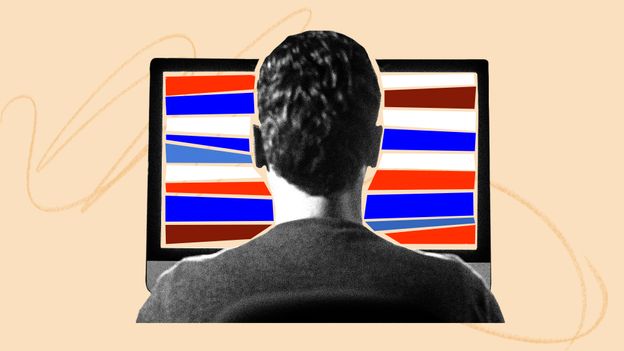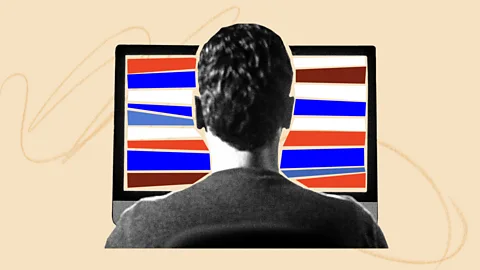 Serenity Strull/BBC/Getty Images
Serenity Strull/BBC/Getty ImagesPapers please: for millions of Americans, accessing online pornography now requires a government ID. It could have global implications for the future of the web.
Pay a visit to the website Pornhub while in the state of Texas today and you may be disappointed. Instead of the usual content you might find on a pornographic website, you’ll get just a single video. It features a fully-clothed adult film star called Cherie DeVille – and she’s discussing public policy.
“As you may know, your elected officials are requiring us to verify your age before allowing you access to our website,” DeVille says in the video. Rather than asking its users to hand over photographic ID on every visit, she explains, Pornhub and its network of sister sites decided to simply block everyone in the state.
Texans aren’t alone. As you read this, a pornography blackout is rolling across the US. In 2023, Arkansas, Mississippi, Utah and Virginia all passed laws requiring age verification, and Pornhub blocked them all as the laws took hold. North Carolina and Montana followed at the beginning of 2024. Legislation in Idaho, Kansas, Kentucky and Nebraska sparked the same treatment in just the past few weeks. And with new laws scheduled to take effect, the shut-off could blanket the majority of the American South by this time next year. Pornhub – the fourth-most-popular website on Earth by some measures – may soon be blocked for one out of three Americans.
To date, 19 US states have passed laws requiring pornographic websites to verify their users age since 2022, and lawmakers have proposed age verification bills at the national level. The move towards requiring ID checks isn’t limited to adult sites, either. Other proposed regulations in the US, the UK, the EU, Australia, and parts of Asia may soon require age verification for social media and a variety of other platforms.
Proponents say it is no different from the ID check required to buy a pack of cigarettes, common-sense safety efforts that will work as well online as they do in retail settings. “It’s very simple,” says Terry Schilling, president of the American Principles Project, a conservative think tank and one of the key organisations advocating for age verification laws. “We don’t think kids should be able to access the amount of pornography that they’re able to access today.”
But those who oppose the new rules say the laws are poorly designed and could even push people to darker parts of the internet, putting children and adults in more danger. They also argue that the repercussions of the new legislation could have profound consequences for the future of the internet and the freedom it affords. “Let’s be honest, between social media and pornography, that’s probably the bulk of everyone’s online activity,” says Daniel Kahn Gillmor, senior staff technologist for the American Civil Liberties Union (ACLU).
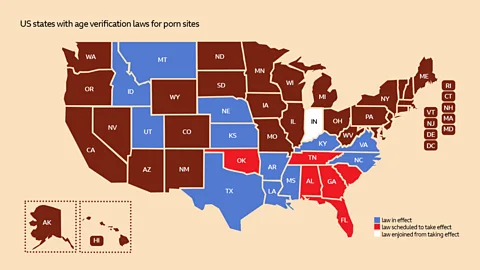 Serenity Strull/BBC/The Free Speech Coalition
Serenity Strull/BBC/The Free Speech CoalitionAnd while few disagree that preventing children from accessing online pornography is a good idea, there are some who feel there are better ways of doing it than a blanket enforcement of age verification rules.
Taken alongside the growing political debate about how best to regulate the online world and the technology platforms that support it, the internet seems to be at a turning point.
Porn: A polarised debate
In case a brought by a coalition including Pornhub’s parent company Aylo and the ACLU this year, the US Supreme Court has agreed to review the issue of age verification. There’s no telling how the court will rule.
In the meantime, access to pornography has become a mounting issue in the background of the US presidential election. Donald Trump’s pick for vice president JD Vance has said in the past that pornography should be outlawed, and influential conservative think tanks are calling for a total ban on porn should Trump regain the White House.
If the age verification movement goes unchecked, it’s possible that you could be forced to tie your government ID to much of your online activity, Gillmor says. Some civil rights groups fear it could usher in a new era of state and corporate surveillance that would transform our online behaviour.
“This is the canary in the coalmine, it isn’t just about porn,” says Evan Greer, director of Fight for the Future, a digital rights advocacy group. Greer says age verification laws are a thinly veiled ploy to impose censorship across the web. A host of campaigners warn that these measures could be used to limit access not just to pornography, but to art, literature and basic facts about sex education and LGBTQ+ life.
“We don’t just oppose it because of some lofty idea about free expression,” Greer says. “We fundamentally believe it will make kids less safe by cutting them off from information about some of the most important topics in their life.”
The new laws simply look for “some quick fix for the internet”, Greer says. “There’s an important and valid discussion to be had about the impact of porn on our society, and platforms should be pressured to do more to protect children,” she says. “But once you need an ID scan in order to browse the web, it immediately creates a barrier to free speech and limits people’s access to information.”
Representatives of groups advocating for age verification, meanwhile, say the trade-offs are worth it, and these new laws are crucial to protecting the safety of children online as well as simple to implement.
“The porn industry is lying to you and being hysterical,” Schilling says. Requiring porn sites to check users’ IDs “is basic common sense. It’s cheap, it’s affordable, and it’s been around for decades. It’s a self-evident truth that kids should not have access to pornography, but even if it wasn’t, some research suggests that early exposure to pornography is very harmful to children”.
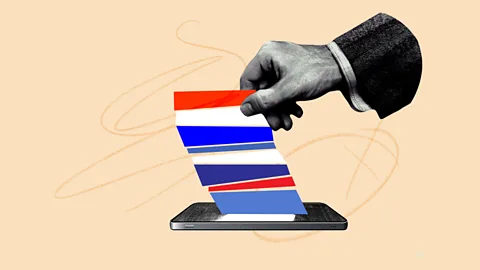 Serenity Strull/BBC/Getty Images
Serenity Strull/BBC/Getty ImagesThe scientific evidence, however, is far from clear. There are a number of studies that suggest that porn can have a negative effect on young people’s attitudes and sexual behaviour, but the extent and scope of those effects are hazy. One meta-analysis found many studies on the topic show signs of bias or a lack of rigorous science, making it hard to draw “valid causal conclusions about effects of pornography on adolescents”. And despite widespread assumptions, studies have found little evidence to support the idea that pornography causes addiction in children or adults.
Opponents of age verification laws rules say the groups pushing these laws are evidence of a larger conservative agenda at play. Kelsy Burke, a sociology professor at the University of Nebraska and author of The Pornography Wars, believes the age verification laws are part of a wider moral battle taking place all over the world.
“Protecting children seems like something we can all agree upon,” says Burke. “But this may not really be about children or even pornography at all. Rather, it’s a way to codify specific moral beliefs about sexuality and gender that may not align with the majority of Americans.”
Organisations pushing for the laws have long been outspoken on LGBTQ+ issues. A primary focus of the American Principles Project, for example, is to oppose the normalisation of transgender identity. The National Center on Sexual Exploitation (NCOSE), a conservative-led anti-pornography group formerly known as Morality in Media that’s also pushing for age verification laws, has a long history of opposing LGBTQ+ rights. The organisation recently expressed “regret” and tried to distance itself from past statements, insisting that “supporting and protecting LGBTQ+ communities” is now a priority for the NCOSE.
Both the American Principles Project and the NCOSE say their support for age verification laws is about protecting children from porn, and nothing more.
“NCOSE recognizes that vulnerability knows no boundaries and affects individuals of all sexual orientations and gender identities. We firmly believe in the importance of supporting and protecting LGBTQ+ communities,” says Dani Pinter, senior legal counsel at the NCOSE. “I think that some groups that opposed to these efforts are disingenuously pointing to this as a distraction.”
Protecting children, or pushing them into the dark?
When it comes to protecting children, leaders in the porn industry say they agree with their harshest critics.
“Pornhub is in favour of the concept of age verification. Full stop,” says Alex Kekesi, vice president of brand and community at Aylo, Pornhub’s parent company. “We don’t want kids on our platforms, and we welcome further regulation to make it difficult if not impossible for children to access age-inappropriate content.”
The problem, she says, is that the current age verification laws are ineffective at protecting children. Internet policy experts it’s trivial to skirt around an internet regulation that only applies in certain states using virtual private networks (VPNs), which let you disguise your location. Plus, kids can just go looking for porn on websites that don’t follow the rules.
Adult industry executives aren’t the only ones voicing this concern. According to more than half a dozen internet and child safety experts who spoke to the BBC, the current set of age verification laws could have unintended effects on how children use the internet.
“These mandates may inadvertently drive children towards more dangerous online environments, both on the clear and dark web,” says Bob Cunningham, chief executive of the International Center for Missing and Exploited Children (ICMEC), in a statement.
While some mainstream porn sites are choosing to comply with the new laws, either by verifying ages or withdrawing from states altogether, millions of other websites don’t bother. And according to many child safety experts, mainstream porn websites do a better job at policing dangerous and illegal content than those that are less likely to follow the new legislation.
The argument from the adult industry is that if people are going to look at porn, the mainstream sites are some of the safer places to do it.
Pornhub has faced criticism over in the past for safety issues for both children and adults on its website. For example, a 2020 New York Times investigation found child sexual abuse material, depictions of rape and other noxious and illegal content on the website. Aylo says these stories misconstrued the issue as such problems were industry-wide, not just in the porn business but across social media and other large platforms.
Pornhub and its sister sites has also been purchased by new owners, and Aylo says it has since tightened its practices. According to Kekesi, every single piece of content uploaded to Pornhub is now manually reviewed by a human being. And while Pornhub believes regular users deserve a heightened level of privacy, the company requires everyone who uploads or appears in content on the platform to verify their age, identity and consent.
In May 2024, Aylo partnered with the Internet Watch Foundation (IWF), a group that works to prevent child abuse online. “Aylo has shown leadership in its efforts to make its platforms safer,” says Susie Hargreaves, the IWF’s chief executive. “We hope other adult entertainment sites follow their example.”
Sites that do adhere to the age verification laws say that there has already been a noticeable reduction in the users staying on its site. xHamster, a leading adult video platform that says it check IDs and complies with all age verification laws in the US, says that only 6% of visitors to its site attempt to go through age verification. Only half of them ultimately succeed. While some users will undoubtedly give up their search, experts such as Greer of Fight for the Future say that most go looking elsewhere.
“To speak frankly, this is leading to the suppression of the most responsible sites in the industry in favour of those that often do not verify uploaders, do not moderate content, do not integrate age verification, and hide their jurisdiction,” an xHamster spokesperson says.
Still, some advocates argue it is too early to know what impact the laws are having.
“I agree that there are better ways to do this,” says Pinter of the NCOSE. There may be a small segment of kids that end up on more dangerous sites, she says, “but many young children stumble upon this stuff accidentally, so the more barriers they have to finding it, the better”.
A Trojan horse?
Similar concerns surround other age verification regulations. For example, the UK Online Safety Act will impose age restrictions on porn, social media and many large online platforms. Wikipedia recently said it will refuse to comply with the UK’s age verification rules because it would “violate our commitment to collect minimal data about readers and contributors”. Regulators haven’t finalised exactly how companies will need to verify ages, but the proposals include the same controversial ID checks.
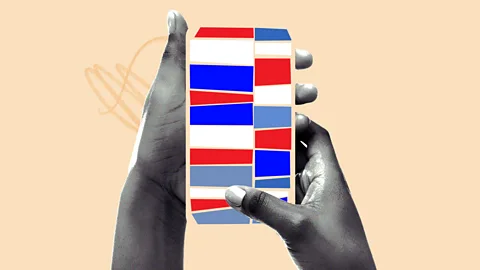 Serenity Strull/BBC/Getty Images
Serenity Strull/BBC/Getty ImagesKelsy Burke of the University of Nebraska and other critics say that many age verification laws are vague enough to sweep up far more than content intended for sexual gratification. The legislation mandating age verification typically applies to any website where 25% to 33% of the content is “harmful to minors”. And in Kansas, for example, the statute which defines content that’s harmful to minors includes “acts of… homosexuality“, she says.
Kansas state senator Jeremy Ryan Claeys, who introduced the state’s age verification law, did not respond to a request for comment.
“There’s never been a clear definition of pornography. It’s just a convenient, pejorative label that politicians and religious leaders have applied to material they don’t like,” says Ricci Levy, president and chief executive of the Woodhull Freedom Foundation, a non-profit that advocates for sexual freedom. “We’re in the midst of huge backlash in the UK and the US around sex and sexuality, and we should be extremely cautious about policing sexuality online.”
Critics highlight the fact that age verification laws are being pursued at the same time Republican-led book bans have taken root across the US, censoring children’s books for mere mentions of issues related to race, gender and sexuality, often under calls to protect kids from “smut”.
There’s no question that online anonymity has contributed to a host of problems such as child abuse, drug trafficking, cyberbullying and other unpleasantries. But civil liberties advocates argue that same anonymity is also responsible for the freedoms that made the internet such a positive, revolutionary force.
“Age verification imposes a burden on adults’ ability to access content, because it means that all users have to verify their ages, not just children,” says Vera Eidelman, one of the ACLU attorney’s working on Pornhub’s upcoming Supreme Court case. It could deal a serious blow to online anonymity, robbing people of their right to explore ideas and speak freely. “Combined, it means people will be much more hesitant to engage with content that is legal to access.”
Pinter acknowledges these are legitimate concerns about age verification that should be mitigated. But, she argues, the “absolutists” also need to accept the need to trade some privacy in order to protect children.
A way forward?
So could there be a way to both protect privacy and children? There is another solution that many opponents of age verification prefer: a system known as “device-based” age verification. Essentially, lawmakers could make technology companies build age verification features into the operating systems on smartphones and computers.
“We believe that device-level age verification offers a comprehensive solution,” says Cunningham of the International Center for Missing and Exploited Children.
All the current state age verification laws require websites to do the checking themselves, typically through the use of third-party tools. That can be a problem, because it outsources digital safety issues to companies that may not have the resources or a track record of protecting users. These aren’t hypothetical concerns. In June, for example, a report from 404 Media found a company used for age and identity verification on platforms including TikTok, Uber and X left scans of drivers licenses exposed online and vulnerable to hackers.
Device-based age verification tools, meanwhile, built by the likes of Apple, Google and Microsoft would presumably be more reliable than third-party tools or systems built by governments when it comes to protecting data from leaks and hackers. (Apple, Google and Microsoft did not respond to a request for comment.)
The device-based approach could also allow governments to mandate the availability of age verification infrastructure but give parents the option to enable it, rather than imposing ID checks on every internet user who visits a porn site. That would put the power in the hands of families, rather than the state. Plus, device-based verification would be cheaper and easier for websites to adopt, increasing the chances of more compliance across the internet. It also helps with privacy concerns; a website could ask your phone to verify your age without sharing any additional information about you.
“Most phones are being bought by parents, not minors, so parents could just set something like this up with parental controls without requiring people to upload their ID,” says Mike Stabile, director of public policy at the Free Speech Coalition. “That’s why we’re so flummoxed by this legislation. There’s an easy way to do it.”
According to the ACLU’s Daniel Kahn Gillmor, the technology exists to build a safe and secure system that verifies a users’ age while protecting their privacy.
Pornhub’s parent company Aylo says it’s ready to dedicate significant resources and manpower to building a comprehensive device-based age verification system, but it needs partners in government and industry to make it work. Supporters of such a project include xHamster, the Free Speech Coalition and Meta, the owner of Facebook and Instagram. NCOSE also supports device-based age verification and has even drafted a model bill legislators could implement – though Pinter stresses that she believes it’s still possible to do safe and effective age verification on the website level.
But some technology policy experts hesitate. Gillmor says lawmakers shouldn’t mandate any form of age verification – even one built by Apple or Google – until a vetted and well-established system is built that ensures civil rights protections. And device-based age verification has its detractors.
“Why should Apple have the responsibility to protect children from porn? It’s not Apple’s problem, this is Pornhub’s problem,” Schilling says. Pornhub is a billion-dollar company, and it’s a farce to suggest it couldn’t come up with a safe, effective way to check users’ ages without violating their privacy, he argues.
Schilling dismisses the entire debate over age verification laws as a bad faith argument from an industry fighting to maintain its billion-dollar portfolios. But for others, the future of free speech on the internet hangs in the balance. In the US at least, it’s now up to the Supreme Court.
“Giving your ID card every time you want to visit an adult platform is not the most effective solution for protecting our users,” DeVille says in her video. “Until a real solution is offered, we’ve made the difficult decision to completely disable access to our website in your region.” It’s a message that millions of Americans will hear by the time the judges weigh in.
#American #war #porn #change #internet,
#American #war #porn #change #internet
